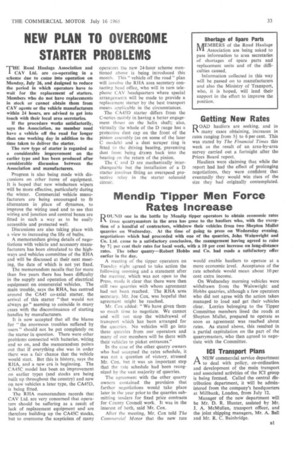NEW PLAN TO OVERCOME STARTER PROBLEMS
Page 35

If you've noticed an error in this article please click here to report it so we can fix it.
THE Road Haulage Association and CAV Ltd. are co-operating in a scheme due to come into operation on Monday, July 26, and designed to reduce the period in which operators have to wait for the replacement of starters. Members who do not have replacements in stock or cannot obtain them from CAV agents or the vehicle manufacturers within 24 hours, are advised to get into touch with their local area secretaries.
If the procedure works satisfactorily, says the Association, no member need have a vehicle off the road for longer than one working day in addition to the time taken to deliver the starter.
The new type of starter is regarded as a considerable improvement on the earlier type and has been produced after considerable discussion between the Association and manufacturers.
Progress is also being made with discussions on other items of equipment. It is hoped that new windscreen wipers will be more effective, particularly during the winter. Commercial vehicle manufacturers are being encouraged to fit alternators in place of dynamos, to improve the wiring used and to see that wiring and junction and control boxes are fitted in such a way as to be easily accessible and protected well.
Discussions are also taking place with a view to increasing the life of bulbs.
A memorandum giving details of negotiations with vehicle and accessory manufacturers has been circulated to the highways and vehicles committee of the RHA and will be discussed at their next meeting, the date of which is not yet fixed.
The memorandum recalls that for more than five years there has been difficulty in the supply and operation of electrical equipment on commercial vehicles. The main trouble, says the RHA, has centred around the CA45 co-axial starter, the arrival of this starter "that would not always go" seeming to coincide in many • cases with the discontinuance of starting handles by manufacturers.
It is now accepted that all the blame for "the enormous troubles suffered by users" should not be put completely on the starter in question. There were other problems connected with batteries, wiring and so on, and the memorandum points out that if everything else was in order there was a fair chance that the vehicle would start. But this is history, says the RHA, and a new era is beginning. The CA45C model has been an improvement on earlier types (and stocks are being built up throughout the country) and now on new vehicles a later type, the CA45D, is being fitted.
The RHA memorandum records that CAV Ltd. are very concerned that operators should be suffering as a result of lack of replacement equipment and are therefore building up the CA45C stocks, but to overcome the scepticism of many operators the new 24-hour scheme mentioned above is being introduced this month. This "vehicle off the road" plan will involve the RHA area secretary contacting head office, who will in turn telephone CAV headquarters where special arrangements will be made to provide a replacement starter by the best transport means applicable in the circumstances.
The CA45D starter differs from the C-series mainly in having a better engagement thrust on the helix shaft; also, virtually the whole of the D range has a protective dust cap on the front of the pinion assembly (as on some of the later C models) and a dust scraper ring is fitted to the driving bearing, preventing dust from being drawn back into the bearing on the return of the pinion.
The C and D are mechanically interchaneeable but the installation of a D starter involves fitting an overspeed protective relay in the starter solenoid circuit.




























































































































